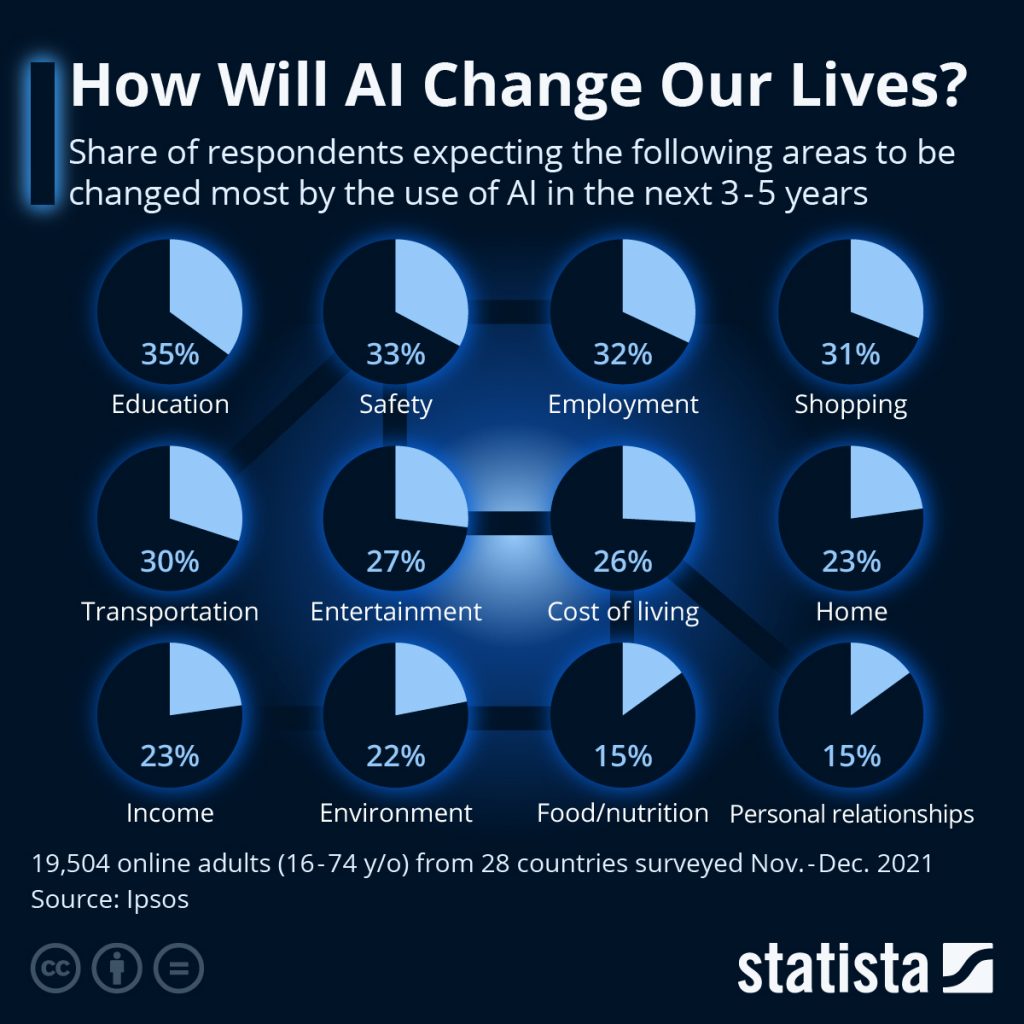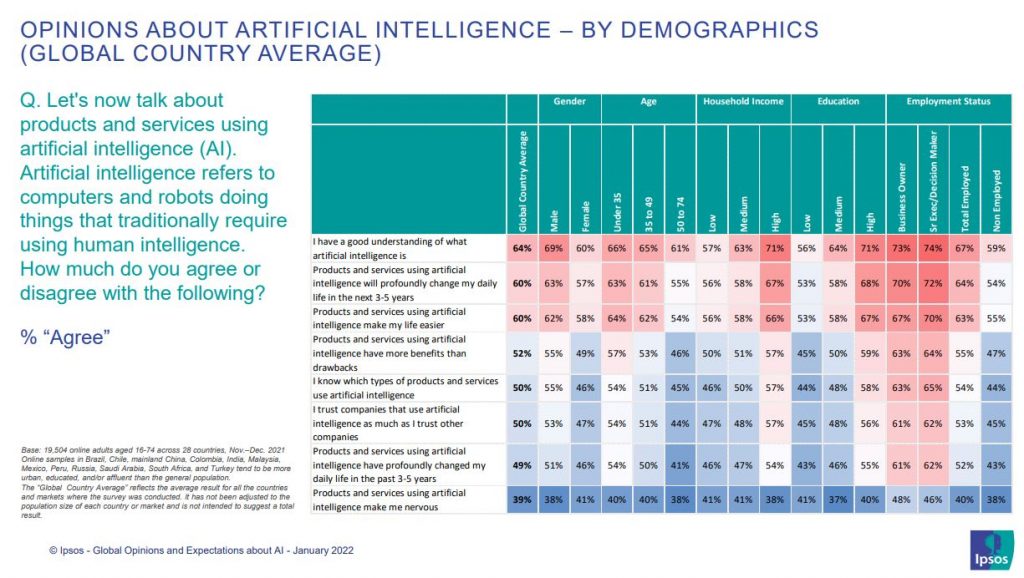A recent Ipsos survey conducted for the World Economic Forum revealed that the majority of adults from 28 different countries believe that artificial intelligence (AI) will significantly impact their daily lives within the next three to five years. Half of those surveyed stated that they have already seen the impact of AI in the past few years. While six out of ten agreed that AI-based products and services make their lives easier, only half of the participants believe that AI has more benefits than drawbacks. Additionally, four in ten adults expressed their unease towards AI-powered products and services. Trust levels towards companies using AI are also split, with only half stating that they trust these companies as much as other companies.
The survey found that nearly two-thirds of adults expect products and services using AI will profoundly change their daily lives in the next 3-5 years

The survey found that the majority of people expect AI to improve their lives in areas such as education and learning, entertainment, transportation, home, shopping, safety, environment, and food and nutrition. However, opinions were divided on the benefits of AI for income, personal and family relationships, and employment, with only 47% of those surveyed believing AI will improve these areas. The survey also highlighted a significant gap between attitudes towards AI in high-income and emerging countries, with citizens from emerging countries being more knowledgeable about AI and expressing a more positive outlook towards the impact of AI in their lives. The survey was conducted online via Ipsos’ Global Advisor platform and included 19,504 adults under the age of 75 from various countries, with data collected between November 19 and December 3, 2021.

Detailed findings
Familiarity with AI

The survey of 28 countries found that approximately two-thirds (64%) of respondents claimed to have a good understanding of AI, however, only half (50%) knew which products and services used AI. The groups that had the highest reported familiarity with AI were business decision-makers (74%), business owners (73%), those with a university degree (71%), and those in the upper-income tier (71%). Males were also reported to have a higher understanding of AI compared to females (by 9 percentage points). These groups were also more likely to know which products and services used AI. Geographically, there were significant variations, with reported understanding of AI ranging from lows of 41% in Japan and 42% in Italy to highs of 78% in South Africa, 76% in Chile and Peru, and 75% in Russia. The reported knowledge of products and services that use AI ranged from 32% in Japan to 76% in China.
It also highlights differences between emerging and high-income economies
Trust in companies using AI

The trust in companies that utilize AI is correlated with the level of familiarity with the technology. The survey found that only 50% of the participants trust companies that use AI as much as other companies. The likelihood of trusting AI-powered companies is higher among business decision-makers (62%), business owners (61%), the more affluent (57%), and those with a higher-education degree (56%). Conversely, those who are 50 and older (44%), those with no higher education (45%), and those who are not employed (45%) are less likely to trust these companies as much as other companies.
Emerging countries, such as China, Saudi Arabia, and India, have higher levels of trust towards companies that use AI. In these countries, majorities trust AI-powered companies as much as other companies, with 76%, 73%, and 68% respectively. On the other hand, high-income countries such as Canada, France, the United States, Great Britain, and Australia have lower levels of trust. In these countries, only about one-third of the population trusts companies that use AI as much as other companies.
How much impact on daily life?

Six in ten (60%) of people expect that products and services using AI will have a profound impact on their daily lives in the next 3-5 years, with 49% stating that this has already been the case in the past 3-5 years. Education and learning (35%), safety (33%), employment (32%), shopping (31%), and transportation (30%) are the top areas where people expect AI to have the most impact on their lives. The level of expectation and perception of AI’s impact on daily life varies based on demographic and geographic differences, which is consistent with the familiarity and trust in AI-powered companies.
For instance, 72% of business decision-makers expect AI to change their lives in the next few years, compared to 54% of those who are not employed. In China and Saudi Arabia, 80% of people expect AI to change their lives, while less than half of the population in Canada, Germany, France, Great Britain, and the US share this expectation.
The impact of AI on education and learning is expected to be the highest by those under 35 and highly educated, on safety by older adults, on employment by those aged 35-49, and on shopping, transportation, and entertainment by the more affluent. In Latin America, particularly large percentages of people expect AI to impact education, safety, and employment, while the Chinese are more likely to expect changes in shopping, transportation, entertainment, and their homes. On the other hand, expectations of AI-driven change in education and learning are notably low in Japan and France.
Does AI improve daily life?

60% of people believe that products and services using AI make their life easier, but only half of them (52%) say they have more advantages than disadvantages, and 39% say these AI-based products and services make them nervous. The demographic and geographic differences in the appreciation of AI products and services match those in familiarity, trust, and perceptions of AI’s impact on daily life. For instance, 87% in China and 80% in Saudi Arabia say AI-powered products and services make their life easier, while only 39% in France and 41% in the United States agree.
AI is expected to make the most significant improvements in education and learning (77%), entertainment (77%), transportation (74%), home (73%), shopping (70%), and safety (69%). In addition, six in ten people expect AI to make things better for the environment (62%) and for food and nutrition (61%). However, people are divided on the benefits of AI regarding income (better for 53%), personal and family relationships (50%), and employment (47%). Only four in ten expect AI to improve their situation regarding the cost of living (42%) and freedom and legal rights (37%).
The average percentage of those saying AI will make life better is no less than 70% in all China, India, Saudi Arabia, and all six Latin American countries surveyed. In contrast, it is only 41% in Belgium and 42% in Canada. In some countries, the percentage of those expecting AI to have a positive impact varies little across categories. This is the case in India, Peru, Malaysia, and Argentina. However, people tend to be more discriminating about which areas AI will improve and which it will not in several other countries, such as Italy, Japan, South Korea, Russia, Turkey, and the U.S. For example, 79% of Italians and 72% of Americans think AI will improve their home, but only 19% and 16%, respectively, believe it will improve their freedom and legal rights.
These are the results of a 28-country survey conducted by Ipsos on its Global Advisor online platform. Ipsos interviewed a total of 19,054 adults aged 18-74 in the United States, Canada, Malaysia, South Africa, and Turkey, and aged 16-74 in 24 other markets, between November 19 and December 3, 2021.

[…] The Impact of AI on Our Lives: Insights from a Global Survey […]
[…] research on green technology, increased support for regional centers of excellence in green technologies and innovation, and the establishment of a multilateral fund to stimulate green innovations and enhance […]